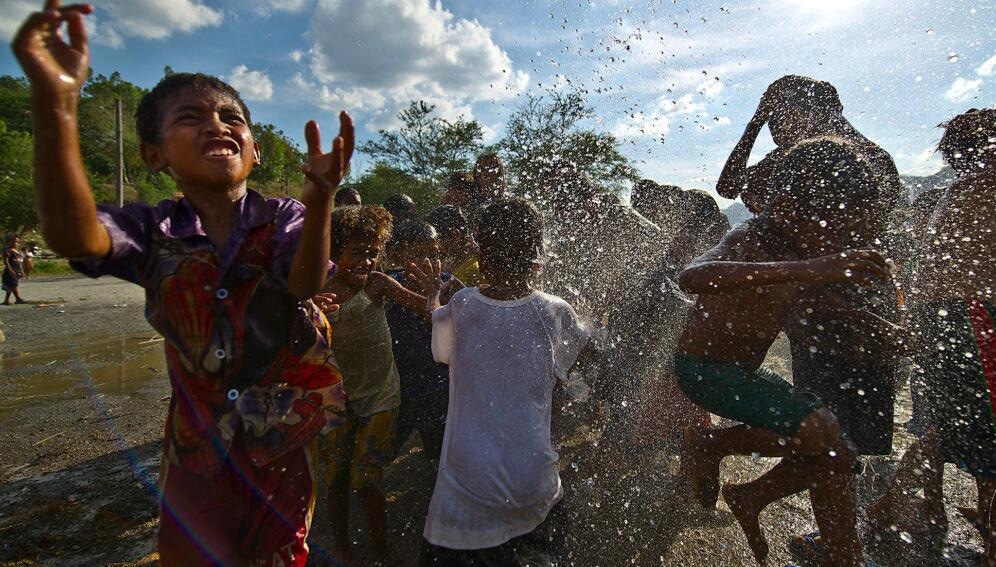Reviewed by Alex SmithApr 12 2022
The World Health Organization (WHO) states that climate change creates a critical threat to human health and urges immediate action and international collaboration to commence on similar scales as witnessed during the COVID-19 response.
 Children in the Philippines cool off by playing with water. Increasing heat due to climate change is one of the issues that the country is facing. Image Credit: © U.S. Air Force Tech. Sgt. Michael R. Holzworth/DMA Hawaii Forward Center/US Department of Defense (CC BY-NC-ND 2.0).
Children in the Philippines cool off by playing with water. Increasing heat due to climate change is one of the issues that the country is facing. Image Credit: © U.S. Air Force Tech. Sgt. Michael R. Holzworth/DMA Hawaii Forward Center/US Department of Defense (CC BY-NC-ND 2.0).
“If we don’t take action today on planet health, we are putting our future health at risk. And when health is at risk, everything is at risk. That’s what we have learned from COVID-19,” Takeshi Kasai, WHO regional director for the Western Pacific Region said addressing a virtual press conference from Manila on 7 April, World Health Day
“Climate crisis is also a health crisis since climate change affects health in many different ways,” Kasai said, underlining the need to design sustainable, climate-resistant health platforms.
Yearly, 3.5 million people across the WHO Western Pacific Region pass away from avoidable environmental causes like extreme weather events, air pollution or waterborne diseases; and every 14 seconds a person passes away from air pollution in the area. Increased levels of air pollution are also causing a spike in non-communicable diseases, including strokes and lung and heart diseases.
The effect of climate change on human health is most intense in the small Pacific Island developing nations, which have the lowest carbon footprint. Each year, these nations constitute two-thirds of the countries internationally that suffer the maximum relative losses from environmental calamities, according to the WHO.
The third publication of the UN Intergovernmental Panel on Climate Change’s (IPCC) Sixth Assessment Report released on April 4th reveals that controlling warming to about 2 °C still necessitates global greenhouse gas emissions to surge before 2025 and be decreased by a quarter by 2030.
The IPCC report concentrates on decreasing emissions and offers feasible ways in for all the sectors that can keep the possibility of controlling warming to 1.5 °C active.
Currently the health sector makes up around five per cent of the global climate footprint and we can do better.
Ifereimi Waqainabete, Minister for Health and Medical Services, Fiji
Waqainabete said the health industry has a leading role to play by decreasing its own emissions and having effective alleviation and adaptation policies to cope with the health effects of the changing climate.
Fiji was one of the world’s first nations to release its own national strategies for climate-resistant, environmentally sustainable healthcare services.
This is guiding our interventions to strengthen and reduce our environmental footprint across key areas: water, sanitation, hygiene, air pollution, energy infrastructure, technology, and the health workforce.
Ifereimi Waqainabete, Minister for Health and Medical Services, Fiji
Addressing the WHO event, Renzo Guinto, a physician and public health expert from the Philippines stated, “We need healthcare that is adaptive to the health impacts of climate change, that bends without breaking, with a ready workforce and stable supplies as we must be the last sector standing when climate disaster strikes.”
While the Philippines deals with progressively serious health hazards as the climate crisis deteriorates, the measures being carried out do not resolve the slow onset climatic impacts, said Renato Redentor Constantino, executive director of the Institute for Climate and Sustainable Cities.
Constantino quoted WHO projections that the mean yearly temperature in the Philippines could increase by around 3.7 °C between 1990 and 2100 in a high-emissions background.
The projected increase in heat indices means that there will be an increasingly severe and regular thermal impact on labour, particularly affecting those working in agriculture, contractual arrangements without health care coverage, and informal urban services and enterprises.
Renato Redentor Constantino, Executive Director, Institute for Climate and Sustainable Cities
“Higher temperatures will worsen land and water scarcity, flooding conditions, drought, and displacement, all of which severely affect agricultural production, which in turn will cause more breakdowns in food systems,” Constantino said, adding that rising heat will also increase hypertensive levels among women.
Regardless of the urgency, the progress in realizing the climate targets is being hindered. “The fundamental challenge is how to move beyond the rhetoric and take actual practical action. The key to that is understanding that action isn’t just needed, but action is also possible,” Mark Jacobs, Pacific technical support director and WHO representative for the South Pacific, expressed to SciDev.Net.
“We don’t need to optimistically wait for someone else to come up with a big solution to this. We can and should all be taking our own steps to reduce our own contribution to climate change as individuals, as families, as communities, and as countries,” Jacobs added.
Under a business-as-usual setup, it is projected that from 2030 to 2050, climate change will cause an extra 250,000 fatalities per year.
“By putting health and equity at the centre of climate policymaking, governments can deliver policies that garner widespread support and maximise returns on investment,” Jeni Miller, executive director of the Global Climate and Health Alliance, said in a media release.
Policies that reduce greenhouse gas emissions can also deliver cleaner air and water, healthier diets, more liveable cities, and transportation systems designed to benefit the health and wellbeing of people.
Jeni Miller, Executive Director, Global Climate and Health Alliance
Regional Director's remarks at the virtual press conference on 7 April 2022
Regional Director's remarks at the virtual press conference on 7 April 2022. Video Credit: World Health Organization Regional Office for the Western Pacific